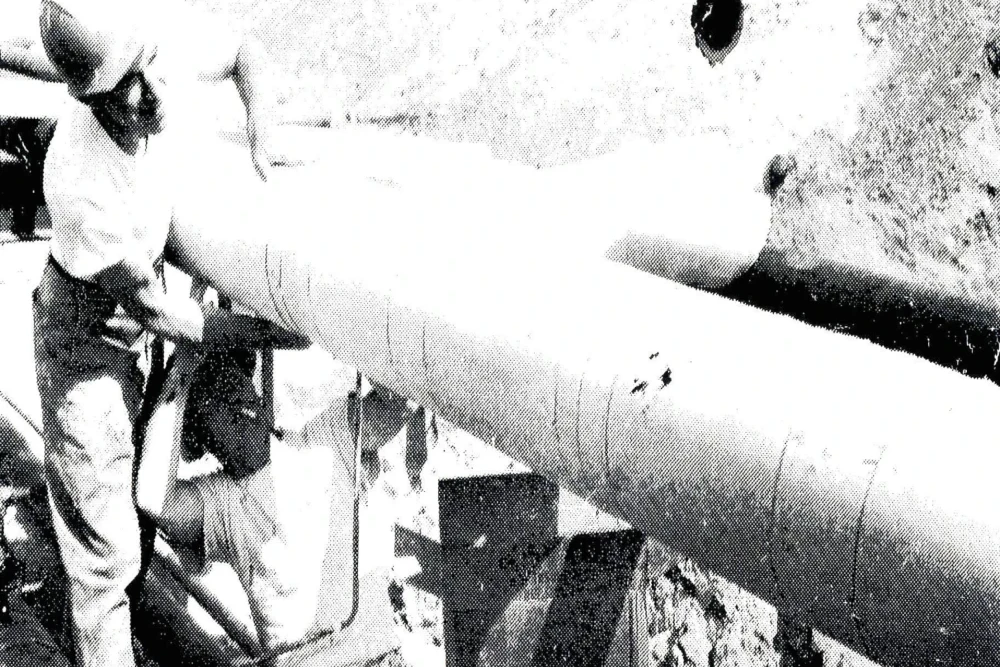Home › Asbestos Job Sites › Oil Refineries
Asbestos Exposure in Louisiana Oil Refineries
Situated along both the Mississippi River and the Gulf of Mexico, Louisiana has been a haven for oil refineries since the drilling of the first oil well in the state in 1901. Before the U.S. government began regulating asbestos, many oil refineries used asbestos-containing insulation materials throughout the refineries. This widespread use exposed countless oil refinery workers to asbestos, putting them at risk of developing serious asbestos-related diseases like mesothelioma.
Last Updated:
- September 29, 2025
Which Louisiana Oil Refineries Used Asbestos?
The oil-rich sediment at the mouth of the Mississippi Delta and the shores of the Gulf led numerous oil companies to construct refineries in Louisiana. Though these weren’t the only Louisiana job sites with asbestos-containing material in play, nearly every oil refinery in the state used it for its heat resistance, durability, and affordability.
Just a few of the Louisiana oil refineries known as sources of asbestos exposure include the following:
- Tenneco Oil Refinery in Chalmette
- ConocoPhillips (Tosco, BP Amoco) Oil Refinery in Belle Chasse
- ExxonMobil Oil Refinery in Baton Rouge
- Motiva (Star/Texaco) Oil Refinery in Convent
- Murphy Oil Refinery in Meraux
- Shell Oil Refinery in Norco
- Citgo Oil Refinery in Lake Charles
Did You Know?
Louisiana’s oil industry accounts for nearly one-fifth of the nation’s refining capacity. Its wells and refineries can process 3.3 million barrels of crude oil daily.
How Oil Refinery Workers Were Exposed to Asbestos
Historically, asbestos components and insulation were widely utilized in oil refineries due to the mineral’s ability to withstand the corrosive properties of refining gas and petroleum products. From the 1930s through the 1980s, oil refineries across the country and Louisiana used numerous asbestos-containing products, particularly the high-temperature thermal insulation for the piping systems that carried the oil, chemical components and their byproducts throughout the facilities. In some cases, the piping itself was manufactured from an asbestos-containing resin or was wrapped in asbestos paper.
Some refinery workers were tasked with installing, repairing, and maintaining the miles of heavily insulated pipe in refineries around the clock. During this work, they tore off worn and fraying asbestos pipecovering and sawed new pieces to fit into place, generating asbestos dust that spread throughout the entire facility and exposing other trades nearby.
A Local 60 Pipefitter's Story
"I was exposed at the oil refineries with asbestos."
I was exposed to asbestos while cutting out insulation to put in the pipe because a lot of these oil refineries were constantly coming down and we had flanges to take apart. We had all sorts of pipe fitting and anytime we had to cut into a line, we knocked off the asbestos insulation. We didn’t know that it was that dangerous. But when they needed a fitter to go in there and help ’em, I went in there.
Asbestos Products Used by Oil Refinery Workers
In addition to the asbestos insulation wrapped around pipes throughout oil refineries, asbestos-containing gaskets and valve packing were used throughout the plants. In addition, oil drilling and refining workers often used asbestos-containing fireproof gloves, jackets, and other protective gear. Other asbestos-containing products refinery workers in Louisiana were exposed to include the following:
- Pipe insulation
- Block insulation
- High-temperature insulation cements
- Firebricks
- Refractory cements
- Spray refractory products
- Asbestos gasket
- Valve packing material
While installing asbestos gaskets in refinery pipes and pumps, workers created asbestos dust by grinding off old gaskets and cutting and pounding new ones, releasing microscopic fibers into the air around them. Thus, asbestos was disturbed and released whether working with old or new gaskets.
These activities with gaskets needlessly put thousands of tradesmen at risk of developing deadly asbestos diseases at a time when asbestos manufacturers knew of the dangers and purposely failed to warn or protect them.
- Our Sponsor, Baron & Budd, P.C.
Tradespeople at Risk of Asbestos Exposure at Oil Refineries

Even if the tradespeople who worked at oil refineries never handled asbestos directly, they all worked alongside asbestos pipe insulators, putting them at risk for exposure. Countless union workers in Louisiana have developed asbestos-related diseases like mesothelioma from this occupational exposure, including workers in the following professions:
At-Risk Family Members of Oil Refinery Workers
Oil refinery plant workers’ family members are also at risk of asbestos exposure. When refinery workers returned home after a day of work, they carried asbestos fibers on their skin and clothing, exposing their children and spouses. A simple hug between a father and child or a load of laundry done by a spouse is enough exposure to put oil refinery workers’ family members at risk of developing a serious illness.
Questions About Mesothelioma?
Many workers are uncertain about what steps to take after receiving a mesothelioma diagnosis.
Was Enough Done to Protect Oil Refinery Workers in Louisiana?
Very little—if anything—was done to protect workers from asbestos exposure at oil refineries in the 20th century. Even though manufacturers of asbestos products and oil refinery owners knew since the 1930s that their products were capable of causing serious diseases, they kept the dangers a secret, exposing millions of innocent workers to the cancer-causing carcinogen out of greed. The companies prioritized profits over people.
Compensation for Oil Refinery Workers in Louisiana
If you or a loved one has worked at an oil refinery in Louisiana and suffer from an asbestos-related disease, you might be entitled to compensation for your losses, including medical costs and pain and suffering. You might be eligible no matter how long ago the exposure occurred.
1) Mesothelioma Lawsuits: You may be eligible to file a mesothelioma lawsuit against those responsible for your exposure, including the manufacturers of asbestos-containing products, jobsite owners, past employers or other contractors.
2) Asbestos Trust Funds: You may also be able to file a claim for compensation from various asbestos trusts, which contain an estimated $30 billion combined.
Did You Know?
Mesothelioma and lung cancer patients may be eligible for anywhere from $500,000 to $10 million in compensation. However, results vary and are not guaranteed.
Mesothelioma Settlements for Oil Refinery Workers
Many mesothelioma victims who have sued asbestos product manufacturers who knew about and ignored the dangers of their products have obtained millions in settlements and jury verdicts. Our sponsor, Baron & Budd, P.C., has recovered several multi-million dollar results for Louisiana oil refinery workers exposed to asbestos on the job, including:
$3.7 Million for Metairie Oil Refinery Pipefitter/Welder
Our sponsor secured $3.7 million in compensation for a Metairie oil refinery pipefitter and welder exposed to asbestos at various industrial sites throughout Louisiana, including oil refineries. The man was diagnosed with mesothelioma at 59, changing his life forever. He underwent countless surgeries and chemotherapy treatments, often leaving him bedridden for most of the day. The lawsuit went all the way to the Louisiana Supreme Court and required overturning a long-standing Louisiana precedent.
$2.5 Million for a Tenneco Oil Company Worker in Chalmette
Our sponsor secured a $2.5 million settlement of a mesothelioma lawsuit brought by a worker sickened after decades of work at Tenneco on the production line for asbestos-containing roofing materials. He eventually succumbed to the cancer, and the lawsuit was amended to include a wrongful death claim.
Results vary and are not guaranteed.

Order Your Free Mesothelioma Book
Contact Louisiana Mesothelioma Advocates

If you or a loved one worked at a Louisiana oil refinery and suspect asbestos exposure, contact Louisiana Mesothelioma Advocates as soon as possible. We will connect you with our sponsor, Baron & Budd, P.C., who can recommend the best mesothelioma physicians and advise you on the best route for compensation. Mesothelioma is an aggressive cancer, and we urge you to act quickly.

Content Reviewed by
Todd Kale
Todd Kale meets with mesothelioma patients and their families across Louisiana to investigate their asbestos exposure, providing compassionate support and guidance during a difficult time.
Jump to a topic
- Which Louisiana Oil Refineries Used Asbestos?
- How Oil Refinery Workers Were Exposed to Asbestos
- High-Risk Tradespeople at Oil Refineries in Louisiana
- Was Enough Done to Protect Oil Refinery Workers?
- Compensation for Oil Refinery Workers
- Mesothelioma Settlements for Oil Refinery Workers
- Contact Louisiana Mesothelioma Advocates

